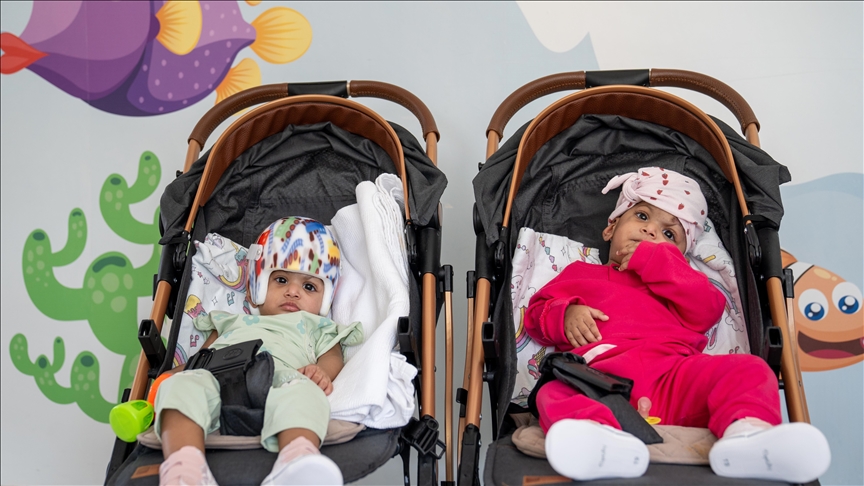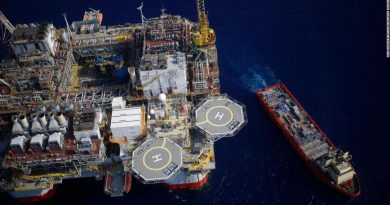Blair, Qaddafi Start Historic Talks In Tripoli
The meeting between Blair, who was in suit and tie, and Gaddafi, seated in a traditional dark brown robe and flat cap with a translator standing by his side, was held in a khaki tent with palm and camel motifs.
Ahead of the landmark visit, the British premier pledged to offer a “hand in partnership” to Libya following its decision to renounce weapons of mass destruction in December, reported Agence France-Presse (AFP).
“It’s good to be here at last after so many months,” Blair said at the start of the meeting held on the outskirts of Tripoli shortly after he started the first visit by a British prime minister since Libya’s 1951 independence.
“You did a lot of fighting on this issue and you look exhausted," said Gaddafi, in an apparent reference to the new warmth between Britain and Libya, which was ostracized in the West for its alleged support of terrorism.
“You look good, you are still young,” he added, as if to correct himself, speaking softly in English, in the presence of journalists.
“There has been a lot to do,” replied the prime minister.
It is the first visit by a British prime minister since 1943 and comes after U.S. Assistant Secretary of State William Burns this week became the most senior American to visit since the 1969 coup which brought Colonel Gaddafi to power.
Economic Benefits
British firms are expected to be keen to exploit business opportunities in Libya during the visit.
The company announced Thursday it had signed a deal with Libya for a "long-term strategic relationship" in the exploration of the North African state’s oil and gas reserves.
A spokesman for Blair told reporters on the flight to Tripoli that Shell, the London-based arm of Anglo-Dutch oil major Royal Dutch/Shell, was Thursday to sign a 200-million-dollar contract for offshore gas exploration rights.
The contract could eventually reach a total of one billion dollars, said the spokesman.
The deal would come at an opportune moment for Shell, currently in the midst of a turbulent spell after admitting in January, and again this month, that it had overestimated its proven oil and gas reserves.
Libya is considered a highly attractive country for the world’s oil giants because of its low recovery costs, the quality of its oil and its proximity to European markets.
“A number of British companies are interested in Libya,” an official traveling with Blair was quoted by the BBC News Online as saying.
Blair aides said Libya could expect cooperation with its defense needs and Britain would, in time, push for an European Union arms embargo to be lifted. Libyan officers may be invited to train in Britain, as Gaddafi himself did as a junior army officer in 1966.
Murder Investigations
The visiting British premiere is also expected to put across robustly the long-made request for help in investigating the death of Wpc Fletcher, a London policewoman killed outside the Libyan embassy in the city in 1984.
British Foreign Secretary Jack Straw said shortly before Blair’s plane landed at the Libyan airport that British police are to visit Libya next month to investigate the murder.
Officers from the Metropolitan Police, London’s force, will travel to Libya on April 3 to pursue the still-unsolved murder of Fletcher, Straw told BBC radio.
The police officer is thought to have been shot dead by a gunman inside the Libyan embassy as she helped police a demonstration outside it.
Straw said further investigations into the murder are one of the benefits from engaging with Libya.
“It is terrible and it remains something that is a daily, hourly, nightmare for the parents concerned, to whom I have spoken,” he said.
Home Opposition
Blair has risked wide controversy at home, as the visit was seen as one of his boldest ever diplomatic maneuvers, including the handshake “with a man who was seen for decades as a personal incarnation of that terrorist threat”.
The prime minister has defended his move, saying he was offering “our hand in partnership” to states giving up terror and banned weapons.
He faced criticism by opponents at home for going to Libya almost immediately after attending a memorial service in Madrid for the victims of the March 11 train bombings in the Spanish capital.
Last year Tripoli agreed to pay compensation for the 1988 bombing of Pan Am Flight 108 over Lockerbie, southwest Scotland, that killed 270 people and remains Europe’s worst-ever terrorist atrocity.
The visit has divided families of those killed at Lockerbie.
American Kathleen Flynn, whose son John Patrick died in the crash, said she found the trip was “insulting”.
But Jim Swire, of the UK Families Flight 103 campaign group, said the visit would “greatly diminish the chances of a backsliding of support for terrorism”.
In the House of Commons on Wednesday, deputy Conservative Party leader Michael Ancram said Blair’s visit was “highly questionable” and its timing even more so


